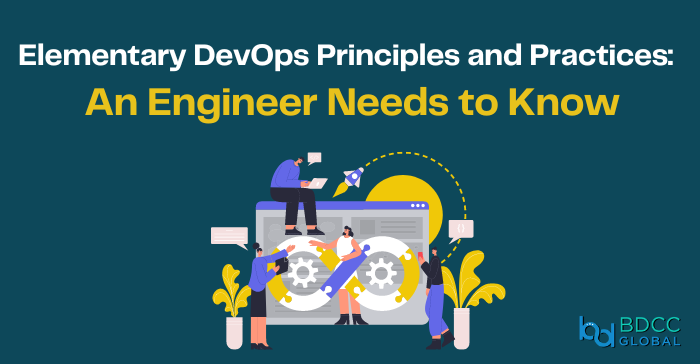
The advent of DevOps has introduced a prolific revolution in the world of technology. It has helped modify the operations of different organizations by streamlining both the development and operations teams. But certain companies fail to implement this methodology as they are unaware of the correct principles. If you are planning to escalate the revenue and productivity of your business, hiring a DevOps engineer is the first step.
It was acceptable when Waterfall development predominated. However, this paradigm is no longer relevant because Agile and continuous workflow have taken over the world of software development. A new strategy and new team responsibilities are needed for short sprints.
Let us learn more about the DevOps principles and how they can benefit engineers in implementation.
By mastering the DevOps principles, engineers will encounter a better grasp over the implementation of DevOps methodology”.
Top 7 Must-Know DevOps Principles and Practices for an Engineer
DevOps is certainly the most popular software development approach. Industry-leading organizations like Etsy, Facebook, Amazon, and more, use this approach in their development. From collaboration to automation, offering a customer-centric approach, to constant monitoring, there are numerous principles to focus on.
1. Integration of Development and Operations
One of the major benefits of DevOps principles experienced is the seamless collaboration of the two major departments – Development and Operations. To make it simpler, this association of the two departments forms the very foundation of DevOps. With the help of proper integration, the development team has a better idea of software configuration suited for the operations phase. Simultaneously, the operations department can also examine if the software will work perfectly.
Furthermore, the art of integration and collaboration is founded on correct information-sharing practices. A glitch uncovered during an application that is implemented needs to be sufficiently logged for the development team to utilize its future builds. Additionally, the feedback acquired also needs to be circulated across the team.
2. Automation
Automation forms one of the prerequisites in every operation of a business. The top DevOps engineer always lays emphasis on gearing up the automation process of any software development lifecycle. With the help of this, the developers obtain additional time for creating code and generating new features.
If you are a tech enthusiast, you might already know that automation acts as a vital building block of a CI/CD pipeline. It also aims to dial down manual errors, thereby boosting productivity levels. Once you encounter automated processes, you will notice how the teams triumph by implementing shorter iteration times. As a result, the teams are able to respond to their customers swiftly.
3. Data-Focused Determination
One of the top DevOps principles is ensuring decision-making by focusing on data. To make it simpler, whether you are opting for the correct tech stack or filtrating tools for streamlining the pipeline, it is crucial to make data the focal point of your decision. This is made mandatory in order to align your choice with that of the team’s metrics and historical data.
Let us comprehend this with the help of an example. A key performance indicator or KPI is a vital tool that determines the complete time taken to resolve a particular issue. Expectedly, the more severe the damage is, the more time it will take. Now, when you’re knowledgeable about the average resolution time taken, you will be conveniently able to introduce fresh procedures or tools in the pipeline.
4. Uninterrupted Development
This is considered one of the main DevOps principles since uninterrupted development is directly linked with uninterrupted delivery enabling the DevOps team to boost the efficacy of the software infrastructure.
Ensuring continuous development is regarded as a predominant factor that can be described as an art of concentrating on experimentation, waste reduction, and optimization of speed, cost, and delivery convenience.
5. Client-Focused Planning
Your planning needs to answer this question positively “Will this decision be beneficial to the client?” One of the principles concerning DevOps methodology is considering the clients the center of attraction. As you will start gathering feedback from the clients regarding the prevalent product or service, your business will soon start experiencing a boost in revenue. The DevOps team conducts live surveillance for addressing issues prior to them becoming a glitch for the clients.
6. Taking Ownership Throughout the Lifecycle
This is among the best DevOps practices that emphasize taking responsibility throughout the lifecycle of the product. During the traditional software development models, it was solely in the hands of the development team to code and develop the application.
Following that, they would turn it over for testing, deploying, and delivering to the clients. In case there is a discovery of any bug in the second phase, its inspection is carried out by the operations team. But now, with the advent of DevOps, the complete operation is equally distributed among all the departments.
7. Don’t Fear Failure
The whole DevOps phenomenon works on an adaptable approach. All the activities are regularly improvised as the software is itself in the maturing phase. Therefore, one of the integral DevOps principles is believing in the opportunity and not fearing it. This will indeed aid in further growth and learning. Instead of being afraid of failure, shift your mindset into risk-taking.
Final Thoughts
When all these principles are embraced, it will automatically result in benefits like a swift response to clients, elevated product quality, better work ambiance, and more. Learning these DevOps principles will indeed act beneficial for an engineer in progressing their intellect.

